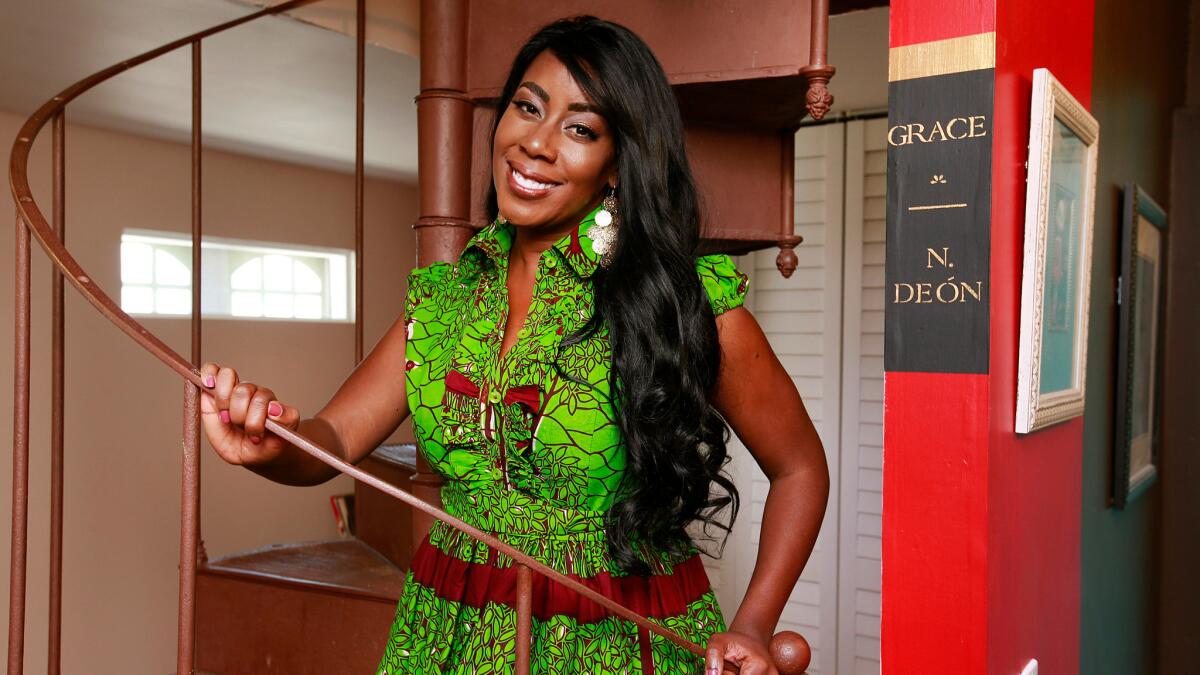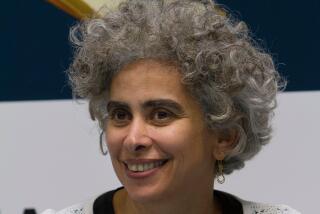Natashia Deón may be the hardest-working debut novelist in Los Angeles

Justice is a concept that is always on Natashia Deón’s mind. As a lawyer, a law professor, a mother and now a novelist, it undergirds all she does.
Sitting in her writing space, a cozy converted garage in a home not far from Six Flags Magic Mountain in Valencia, flanked by a spiral staircase and a Murphy bed, a dark wood desk and an overstuffed bookshelf, she says, “The first time that I wanted to quit being a lawyer was two weeks after I passed the Bar.”
She was representing an insurance company in a mediation, with the authority to give the injured party a few hundred thousand dollars. The client’s attorney told Deón that they could settle immediately if she gave the client just $5,000 and paid her, the attorney, $30,000 in fees. Deón was visibly upset. “This isn’t justice,” she said. The judge responded, “You should know by now, there’s no such thing as justice.”
Deón didn’t stop practicing law, but she did carry that sentiment to her debut novel, “Grace.” The book was published by Counterpoint in June to rave reviews. In the novel, Naomi, the narrator — the specter of a dead slave — watches over her child as she grows amid the turmoil surrounding the Civil War. At one point, Naomi’s ghostly presence is felt in the land of the living, where a character says to the wraith, “There’s no justice. Only grace.”
The bedrock of the book was a daydream that hit her like a bolt of lightning as she walked around her home, holding her newborn son.
“I was walking down the hallway, when the hallway suddenly became dark,” Deón says. “It was nighttime, and I was in the woods, the moon was full, and I knew somehow that it was Alabama. I held my son closer to my chest, and I saw a girl in a yellow dress, blood-stained.”
After the vision was over, she passed her infant son to her husband so she could write down the scene that would later become the opening of “Grace” — a rare moment of handing off her son, because at that time, he almost never left her arms. “When I was pregnant with him, I was working two jobs. I was making a lot of money. We had a nice house, nice cars — all the stuff that I thought I wanted — the American dream,” she says. “I thought that I’d be off 12 weeks, and then I’d be back at work. But when he was born, it stopped everything. I couldn’t go back because I knew there was something wrong with my baby.”
Doctors at first seemed to think he was fine, but Deón knew better. Her son was eventually diagnosed with succinic semialdehyde dehydrogenase deficiency, or SSADH, a rare metabolic condition that left him with both muscle weaknesses and mental delays — effectively silencing him.
“It helped me to shift what I was doing with my life,” she admits. “It got me thinking about who will take care of him after I’m gone. My daughter? The state? These things change the way you see the world.”
Deón quit her job, and she and her husband left their American dream behind — their home, their cars, their nice, cushy life. She found a different American dream — one focused more on love and grace than money and possessions.
It also allowed her to focus more on a lifelong passion: writing. In 2010, she was a part of the PEN Center USA’s Emerging Voices Program. A couple years later, she earned an MFA in creative writing from UC Riverside-Palm Desert. Although she still does legal work, mostly trying to get pardons for ex-cons, after her son was born, she couldn’t justify working corporate hours.
Because it took her seven years to write “Grace,” having the novel out now feels unreal to her. How has her life changed since its release in June? “Well,” she says coyly, “for one, I’m talking to you. The L.A. Times is in my house, and I didn’t kill anyone.” She laughs. And in her laugh you can sense her entire history, everything that brought her to this moment, including that exit from corporate law after the birth of her son: “It was the last wave of a longtime-coming miracle. Freedom, direction and service.”
But her son’s disability did more than help her re-prioritize, it taught her the importance of silences. This greatly affected her writing: “It’s made me try to create silences for things to happen. It helps me to cut to the chase of what people say. It’s all in what’s not said; it’s the stuff that comes in-between.”
For Deón, one thing that comes in-between, that fills these silences, is love. She admits loving people “recklessly.” Her heart is always open — a beating, fist-sized eye — seeing the world from other people’s perspectives — her clients, her characters, anyone.
“In a court of law, you’re always looking for the ‘why?’ It’s all about motive,” she says. “Likewise, with a character, I’m always thinking: ‘Why would this character do that?’ I try to see from their point of view. There are some people who are just evil, who have a mental defect that causes them to do bad things, but for most people, there’s a history that gets them to where they are and to what they do. When I look at my characters, I question how they got to this point.”
That empathy isn’t confined to her fiction. In 2010, she and her husband attended a reading by an author she knew. They were the only people in the audience. Deón told herself then that no one should read to empty chairs; soon after, she founded the Dirty Laundry Lit reading series, which is equal parts party and reading (the next one is Nov. 5).
When asked if she considers herself more of a lawyer, a law professor or a writer, Deón says, “I don’t know what I am, but I’m always the same person.” Regardless of what role she takes on, Deón is always someone with a strong moral compass coupled with an enormous capacity for empathy.
In “Grace,” Deón writes, “It’s been said that justice is getting what you deserve. And mercy is not getting the bad you deserve. Grace is getting a good thing, even when you don’t deserve it.” From a certain angle, one could see justice, mercy and grace — these embodiments of the gray areas between love and ethics — as the triumvirate forces that rule the book. Yet it took time for them to percolate through the story. Sitting in her work space, where Nina Simone’s “Baltimore” leans against a stack of records in the corner, Deón says the line that ties together justice, mercy and grace “was actually the last thing I wrote.”
Malone is a writer and professor of English. He is the founder and editor-in-chief of the Scofield and a contributing editor for Literary Hub.
More to Read
Sign up for our Book Club newsletter
Get the latest news, events and more from the Los Angeles Times Book Club, and help us get L.A. reading and talking.
You may occasionally receive promotional content from the Los Angeles Times.






